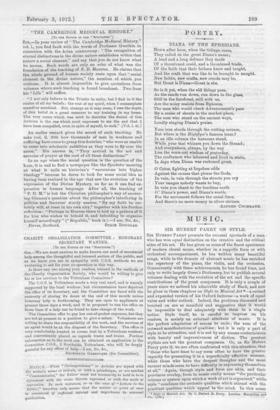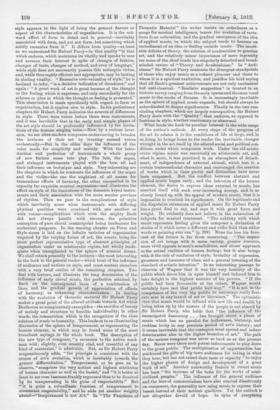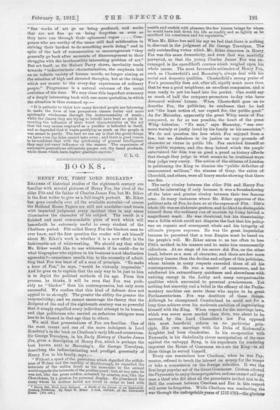MUSIC •
SIR HUBERT PARRY ON STYLE.
Sin litnEnT PARRY presents the unusual spectacle of a man who has won equal distinction on the creative and the critical sides of his art. He has given us some of the finest specimens of modern choral music, whether in a cappella form or with orchestral accompaniment, he has written many beautiful songs, while in the domain of abstract music he has enriched the repertory of the piano, the violin, and the orchestra. Concurrently with these achievements, he has found time, not only to write largely Grove's Dictionary, but to publish several volumes dealing with the evolution of the art and the specific contributions of the great composers. It is only a couple of years since we noticed his admirable study of Bach, and now he gives in these chapters on Style in Musical Art *---a revised and expanded version of his Oxford lectures—a work of equal value and wider outlook. Indeed, the problems discussed and touched on are so manifold and suggestive that it would be impossible to deal adequately with them in a single notice. Style itself, he is careful to impress on his readers, is mainly an external- attribute of music. It is the perfect adaptation of means to ends ; the sum of the outward manifestations of qualities ; but it is only a part of style to be attractive, and it is not by any means conterminous. with beauty and impressiveness of diction. The greatest stylists are not the greatest composers. Or, as Sir Hubert. Parry puts it, we are often confronted with this situation, that "those who have least to say seem often to have the greater capacity for presenting it in a superficially effective manner, while those who have the deepest thoughts and the most earnest minds seem to have difficulty in expressing themselves at all." Again, though style and form are akin, and their provinces overlap, form in music really means "the particular scheme or system upon which a work of art is organized," while, style " combines the instlietio qualities which attract with the practical qualities which appeal to the mind. In this sense • SiVid Musical Art. By C. Hubert H. Parry, Loudon; Macmillan and Co. [108.1 style appears in the light of being the general flavour or aspect of the characteristics of organization. It is the out- ward effect of form in detail and in general—inevitably associated with form, and yet not form, but something which subtly emanates from it." It differs from quality—at least so we understand Sir Hubert Parry—in that quality "is that which endures, which maintains its vitality and speaks to men and arouses their interest in spite of changes of fashion, -changes of taste, changes of method, and even of language," .while style does not necessarily possess this antiseptic virtue, :and,•while thoroughly efficient and appropriate, may be lacking iin abiding vitality. " Excessive over-valuation of style," he is inclined to infer, " is a decisive indication of decadence," and again : " A great work of art is great because, o1 the thought or the feeling which it expresses, and only secondarily for the scheme or plan in which the thought or feeling is presented." This observation is made specifically with regard to form or .organization, but it applies also to style. In his preliminary chapters Sir Hubert Parry indicates the sources of differences in style. There were yokes before there were instruments, and it was inevitable that in the early and simple phases of the art style should be profoundly influenced by the limita- tions of the buman singing voice.—Now, by a curious inver- sion, we see ultra-modern composers endeavouring to broaden the horizons of their art by treating massed voices orchestrally.—But in the olden days the influence of the voice made • for simplicity and melody. With the intro- duction and perfection of instruments a whole group of new factors came into play. The lute, the organ, and stringed instruments played with the bow, all had their influence on technique and style. Very interesting are the chapters in which. he contrasts the influences of the organ and the violin—the one the mightiest of all means for tremendous effects of harmony, the other unequalled in its capacity for exquisite musical expression—and illustrates the effect on style of the limitations of the domestic keyed instru- ments and their association with the more secular province of rhythm. Then we pass to the complications of style which inevitably arose when instruments with differing physical qualities were combined with one another or with voices—complications which even the mighty Bach did not always handle with success, the primitive conception of pure choral counterpoint being inadequate for oacheatral purposes. In the ensuing chapter on Form and Style stress is laid on the infinite varieties of organization required by the varying forms of art, the sonata being the most perfect representative type of abstract principles of organization under an aristocratic regime, but wholly inade- quate when transplanted to the sphere of musical drama, We shall return presently to the lectures—the most interesting in the book to the general reader—which treat of the influence of audiences and nations on style, and must content ourselves with a very brief outline of the remaining chapters. Two deal with texture, and illustrate the long domination of the influence of early choral music, the perfection attained by Bach on the contrapuntal basis of , a combination of lines, and the gradual growth of appreciation of effects of harmony, as enhancing characterization. In dealing with the evolution of thematic material Sir Hubert Parry makes a great point of the altered attitude towards Art which Beethoven so conspicuously exemplifies—the sacrifice of beauty of melody and structure to forcible individuality; in other words, the romanticism which is the recognition of the close relation of music to humanity. This leads on to an illuminating discussion of the sphere of temperament, as representing the human element, in which may be found some of the most trenchant sayings in the whole book. The description of the new type of composer, "a reversion to the native wood- man wild ; slightly, even scantily clad, and resentful of any kind of constraint," is admirable. But, as Sir Hubert Parry magnanimously adds, " the principle is consistent with the course of art's evolution, which is inevitably towards the greater differentiation." Temperament, as he goes on to observe, "comprises the very noblest and highest attributes of human character as well as the basest," and "it is better at least to see even baseness frankly expressed than to be deceived 'by its masquerading in the guise of respectability." But 4" it is quite a subordinate function of temperament to counteract respectability," and he adds yet another weighty caveat--" temperament is not Art," In " The Functions of Thematic, Material " the writer insists on orderliness as a gauge for musical intelligence, traces the evolution of varia- tions from reiteration, and the gradual emergence of the idea of applied music, in which the subject tends to become an embodiment of an idea or feeling outside music. The inevit- able defects of theory, the relation of academicism to genuine art, and the relatively minor importance of mere ingenuity are some of the chief heads in a singularly detached and broad- minded review of " Theory and Academicism." In " Anti- theses" Sir Hubert Parry contrasts the divergent standpoints of those who enjoy music as a refined pleasure and those to whom it is a spiritual exaltation, and justifies his bold saying that all Bach's greatest achievements are not only unclassical but anti-classical. " Realistic suggestion" is treated in an historic survey ranging from the early operas and German vocal music to the works of Strauss. It is increasingly inevitable as the sphere of applied music expands, but should always be subordinated to deeper significances. Finally in the two con- cluding chapters, which are largely retrospective, Sir Hubert Parry deals with the " Quality " that endures, as opposed to fashions in style, whether reactionary or abnormal.
What lends the book its peculiar interest is the wide range of the author's outlook. At every stage of the progress of the art he relates it to the conditions of life at large, and in so doing he brings home to the reader the inevitable changes wrought in the art itself by the altered social and political con- ditions under which composers work. Under the old aristo- cratic regime music was essentially an aristocratic art, and, what is more, it was practised in an atmosphere of detach- ment, of independence of external stimuli, which lent it a certain transcendental character and encouraged the creation of works which in their purity and distinction have never been surpassed. But the conflict between abstract and applied music began early; and the intrusion of the human element, the desire to express ideas external to music, has asserted itself with such ever-increasing energy, and is so closely bound up with the appeal of modern music, that it is impossible to overlook its significance. On the legitimate and the disputable extensions of applied music Sir Hubert Parry has a great deal to say, and says it with great force and weight. He evidently does not believe in the exhaustion of subjects for musical treatment. " The subtlety with which music represents feeling gives the composer a divination of shades of it which cover a different and wider field than either words or painting ever can" (p. 298). None the leas his fore- cast of the future is far from reassuring. " The expan- sion of art brings with it more variety, greater resource, more vivid appeals to men's sensibilities, and closer approach to the actual realities of human feeling ; but it also brings with it the risk of confusion of style, brutality of expression, grossness and baseness of ideas, and a general lowering of the standard of artistic intention." In an interesting passage be observes of Wagner that it was the very hostility of the public which drove him in upon himself and induced him to take delight in the highest exercise of his powers. " If the public had been favourable at the outset, Wagner would certainly have met that public half-way." "It is not in the competence of the very big public to encourage really first- rate men in any branch of art or literature." The optimistic view that music would be infused with new life and health by being taken up by the masses of the people is not shared by Sir Hubert Parry, who holds that " the influence of the emancipated democracy . . , has brought about a phase of music which has no parallel for hollowness, blatancy, and reckless levity in any previous period of art's history ; and it seems inevitable that the contagion must spread and induce deterioration also in the higher branches of art." The path of the serious composer was never so hard as at the present day. Never were there such potent inducements to play down to the gross public. The multiplication of opportunities has quickened the gifts of big town audiences for taking in what they hear, but has not raised their taste or capacity " to enjoy the higher phases of design and development of a great work of art." Another noteworthy feature in recent musio has been "the increase of the taste for the works of semi- civilized peoples." The influence of the general audience and the lure of commercialism have also reacted disastrously on composers, the generality now using music to express their basest instead of their noblest qualities. Yet the outlook is not altogether devoid of hope. In spite of everything
" fine works of art go on being produced, and works that are not fine go on being forgotten as soon as they have run through their ephemeral vogue . . . .Cora- posers who are worthy of the name still find exhilaration in striving their hardest to do something worth doing," and in spite of the lack of remuneration or encouragement " they generally go back after elements of discouragement to their struggles with the inexhaustibly interesting problem of art." But art itself, as Sir Hubert Parry shows, inevitably tends towards " indiscriminate characterization, the emphasis laid on an infinite variety of human moods, no longer aiming at the selection of high and elevated thoughts, but at the things which are nearer to the every-day experiences of ordinary people." Programme is a natural outcome of the social evolution of the time. We may close this imperfect summary of a deeply interesting book with one more quotation, in which the situation is thus summed up :—
0 It is pathetic to think how many devoted people are labouring to make the lives of leas prosperous classes better and more spiritually wholesome through the instrumentality of music; while the classes they are trying to benefit have been so quick in exerting the influence of their worst characteristics on the art that the very means employed as a purifier is befouled in itself, and so degraded that it wants purifying as much as the people it was meant to purify. The best we can say is that tho groat things we have even the fates cannot take away ; and there is good reason to be confident that with the quickening of general intelligence they may yet exert influence on the masses. The experience of successive generations ultimately purges out the baser products, while those which have higher qualities survive."
C. L. G.












































 Previous page
Previous page